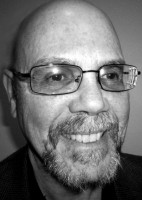Know Your Neighbor: Richard Courage, English Professor, Valhalla

Two of Richard Courage’s top professional achievements he owes to an old friend and mentor.
In the 1980s, Courage was teaching high school English in New York City finding it difficult to complete his doctorate at Columbia University’s Teachers College while working fulltime and raising a young family. By the end of the decade, his professor, Robert Bone issued an ultimatum.
“He told me after years of struggling at my dissertation I had a choice: I could either finish with him–he gave me one year’s notice before he retired–or I could start all over with someone I didn’t know,” Courage recalled. “So I finished.”
The gentle kick in the pants led directly to Courage realizing his longtime goal of teaching college when he was hired by Westchester Community College in 1990, where today the Valhalla resident is an English professor. Over the next decade and a half, Courage stayed in contact with Bone, who had begun work for a book exploring the rise of African-American artistic expression on Chicago’s South Side in the 1930s and ’40s, similar to the Harlem Renaissance.
However by 2006, Bone’s health was failing and Courage proposed the idea of finishing the project. Bone and his family agreed and Courage took a partial manuscript of about 150 pages and completed the research and writing.
Last fall, at 65 years old, and four years after Bone’s death, Courage became a published author for the first time with the release of “The Muse in Bronzeville: The African American Creative Expression in Chicago, 1932-1950.” To say it was a challenge is an understatement. Aside from squeezing in several research trips a year into his already busy schedule, it wasn’t a topic that Courage was overly familiar with.
“I taught African-American history most of my career but I had never been to Chicago,” he said. “I didn’t know much about visual arts beyond the occasional casual museum visit. The visual artists were important to the story. I love music but I had to learn everything that Robert Bone knew and go beyond to finish the book.”
It also didn’t help that Courage was a “double outsider,” a white scholar researching a black topic and a New Yorker in Chicago.
However, once Courage began meeting the community’s elders who were instrumental in making the South Side an artist’s Mecca in the ’30s and ’40s, some of whom were in their 80s and 90s when he spoke with them, many of the barriers began falling.
“It’s a very different book than the manuscript I received,” Courage said. “That’s important to say because I’m proud of my contribution to it.”
Courage had developed a kinship with Bone likely because they shared a radical left bent. While he described Bone as a 1940s socialist, Courage’s own view of the world was shaped through the images he saw on television of the southern civil rights movement in the late 1950s and early ’60s. It was very different from what he had previously accepted as reality growing up in an all-white Brooklyn neighborhood.
“Watching TV, images of kids about my age attacked by police dogs, clubbed to the ground, arrested because they wanted to go to decent schools, they’re folks wanted to vote–basic American rights–and that kind of undermined a certain world view that I inherited from my elders, that people who work hard do well and get ahead,” Courage said. “People who don’t are just lazy.”
Courage went to Manhattan College as a liberal arts student where he enjoyed school for the first time. Later, he attended Boston University with his sights set on a doctorate in philosophy before dropping out and returning to New York. In the ensuing years Courage worked at a string of odd jobs, taught in New York City Catholic schools and held administrative posts but his dream was to become a professor.
After finally earning his doctorate, Courage said he was fortunate to have found a home a Westchester Community College. He bemoans today’s lack of social involvement on issues by the public, although called himself an “inactivist” for not doing much himself.
What has been satisfying for Courage since ‘Muse in Bronzeville’ was released by Rutgers University Press last fall has been the strong reviews it has received from academia, the subjects he interviewed and the literary world. His efforts have also paved the way for him to tackle other projects including a follow-up anthology of writings from black Chicago and a work with Roosevelt University scholar Christopher Reed about a collection of essays from black Chicago writers.
“I think I’m going to have to live to 100 because things have opened up,” Courage said.

Martin has more than 30 years experience covering local news in Westchester and Putnam counties, including a frequent focus on zoning and planning issues. He has been editor-in-chief of The Examiner since its inception in 2007. Read more from Martin’s editor-author bio here. Read Martin’s archived work here: https://www.theexaminernews.com/author/martin-wilbur2007/

